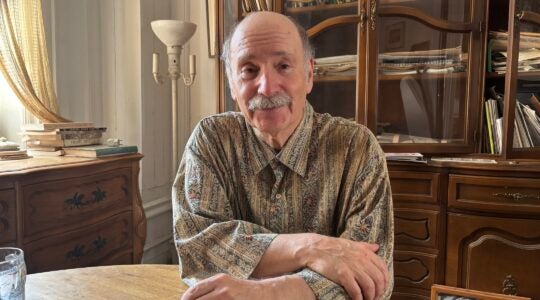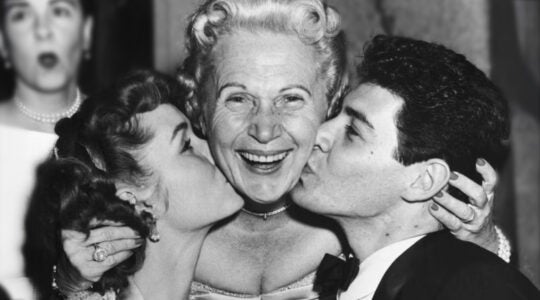The Brooklyn Lyceum, a performance space on the outskirts of gentrified Park Slope, opened in 1910 as a public bathhouse. But this Friday night several hundred young Jews will file through the bar that leads to its 4,000-square-foot theater for Kol Nidre, the prelude service for Yom Kippur.
That the Lyceum will be used as an impromptu synagogue is not unique — for decades synagogues have sought alternative spaces to accommodate the swell of attendees they see on the High Holy Days. But that the service, run by a group called Ohel Ayalah, will be completely free and open to anyone on a walk-in basis is part of a phenomenon that has forced synagogues across the country to rethink how they do business on Rosh HaShanah and Yom Kippur.
In all, more than 2,000 young Jews will likely attend free Ohel Ayalah services being held in Brooklyn, Manhattan and Queens, according to the group’s founder Rabbi Judith Hauptman, a professor of Talmud at the Conservative movement’s Jewish Theological Seminary.
Rabbi Hauptman has watched attendance at Ohel Ayalah grow from about 200 in its first year eight years ago, when she held one service at the First Presbyterian Church in the West Village. And free, independent services like hers are cropping up around the country. As they do, more and more mainstream, established synagogues are adopting the practice of opening their doors for free during the holidays.
The Jewish Week talked to more than a dozen rabbis and executive directors at synagogues and officials of the umbrella groups that help run their religious streams and found that, across the board, synagogues are rethinking how they use the High Holy Days.
As they struggle to convince potential congregants to pay dues that can reach upwards of $5,000 per year, synagogues are now looking at seats in their High Holy Day services not as a way to make extra money through their sale, but as a way to lure more attendees, often at no cost. The concept, synagogue officials say, is something akin to a community open house on the holiest days of the Jewish calendar.
While many synagogues — especially in New York — still hold on to the practice of selling seats, a wave of others is now removing the price tag that nonmembers often see as blocking the path into shul.
“I have seen over the past decade a major shift in how the Orthodox synagogue sees itself,” the executive vice president of the Orthodox Union, Rabbi Steven Weil, told The Jewish Week. “Today’s synagogue sees itself as a communal institution rather than a club for members.”
He describes a trend of synagogues developing beginners’ services and educational services designed to attract young families and singles. Some 250,000 families — between 800,000 and 1 million people — are affiliated with OU synagogues, according to Rabbi Weil. But to grow that affiliation, synagogues have realized that they need to become more inclusive.
That starts with the High Holy Days, according to the rabbi, who visits more than 70 synagogues per year as a guest speaker and consultant, and who runs free educational High Holy Day services at Congregation Keter Torah in Teaneck, N.J.
“There is a responsibility to service the community,” he said. “It’s a broader vision.”
In a sense, many synagogues are now adopting an approach Chabad-Lubavitch synagogues have used for years — opening the doors to the shul on the holiest days in hopes that people will come back during the rest of the year.
“It’s a time of the year on the Jewish calendar that is particularly spiritually charged, and a time when many Jews are looking to connect,” according to Chabad’s media relations director, Rabbi Motti Seligson. “The way we see it, Judaism belongs to every Jew and we try to remove any barriers to engagement.”
Part of the issue is that synagogues are trying to reach a generation that doesn’t understand “why they would have to pay to sit for three days,” according to Kathy Elias, the chief kehilla officer at the United Synagogue of Conservative Judaism. “This idea of having a money exchange in order to sit in sacred community is not something that makes sense to people who are in a generation where they have open access to pretty much anything they want. And we have to adjust to it.”
Columbus, Ohio, is a somewhat provincial Midwestern city with 25,000 Jews and eight synagogues, according to Rabbi Howie Zack, the leader of the Orthodox Congregation Torat Emet, also known as The Main Street Synagogue.
Yet in a city that is fairly saturated with Jewish organizations, Rabbi Zack says that competition to get people into his shul for the holidays is stiff — especially given that a large segment of the population lives in Columbus for only a few years while they study at Ohio State University’s graduate schools.
Charging for services, he said, is simply a turnoff. “What you have made, then, is a fee-for-service event,” he said.
Instead, Torat Chaim has an open-seat policy during the holidays and asks that attendees make a donation if they want.
“It’s the removal of an impediment,” Rabbi Zack said. “When it comes to the holidays, this is a spiritually uplifting time, and if you charge them they think, ‘You want me to give you money? Why make that my first experience with you.’”
It’s an approach that has worked well for Congregation Beth Simchat Torah, New York’s gay and lesbian synagogue in the West Village. Its free services at the Javits Center and Town Hall have sometimes attracted 5,000 worshippers, and the synagogue is on sound enough financial footing that it has recently purchased its first building, in the West 30s.
Elsewhere in New York, the website Brokelyn.com listed more than a dozen synagogues in the city’s largest borough that offer free — or near free — services on the High Holy Days, including a hotline number at the UJA-Federation of New York where callers can find services open to non-shul members ([877] 852-6951 or e-mail J11@ujafedny.org).
Outside of New York, The Jewish Week spoke to synagogues in Kansas, Seattle, New Jersey and others that offer free seats as a way to get people into shul.
Not charging for the holidays was one of the tenets with which Rabbi Sam Gordon helped found the Reform Congregation Sukkat Shalom on the North Shore of Chicago 17 years ago.
Though more than 1,000 people are expected to come through the doors of the Mormon church that the synagogue rents on the holidays to accommodate its guests, Rabbi Gordon said that his congregation wanted to make sure that no one felt turned away by a fee.
“We are trying to build a community, and we don’t want there to be entry barriers,” he said.
So, his synagogue has no dues structure at all, an idea Rabbi Gordon says he learned when earning an MBA at Northwestern University’s Kellogg School of Business. Instead, the congregation asks only for voluntary donations throughout the year.
“We have this unique view that we are all adults, and people understand the synagogue needs support,” he said. “In a donor-based institution, if you have a compelling reason to be a part of the community, you are going to want to support it.”
This is a difficult time for shuls to move away from a model of charging for seats that in the past has made up 5 percent to 10 percent of the typical synagogue’s budget. Congregations have already slashed their budgets since the recession hit three years ago, as their members have had difficulty paying their dues.
“It’s been challenging,” said Rob Berkovitz, a finance specialist for the Union of Reform Judaism. “People who are members of synagogues are struggling.”
But the High Holy Days present an interesting fundraising opportunity of their own, said Berkovitz.
And many synagogues are now taking the long view and using the holidays as a way to recruit new members. Their reasoning is that, better than a small short-term infusion of cash, the approach can pay dividends over many years if attendees ultimately become members.
“I wouldn’t look at it as a loss of income,” Berkovitz said. “You are building a connection to them so they will not just show up for one time a year hopefully. It’s not just about paying for tickets but about all the possibilities of belonging to a congregation.”
And while Ohel Ayalah’s Hauptman says that she often has “gotten the cold shoulder” from rabbis who view her free service as competition, the idea is that ultimately young Jews who would have never otherwise attended holiday services will one day find congregations of their own. And she is happy that the mainstream is catching on.
“If enough synagogues offered free services,” she said. “I wouldn’t have to.”
The New York Jewish Week brings you the stories behind the headlines, keeping you connected to Jewish life in New York. Help sustain the reporting you trust by donating today.




